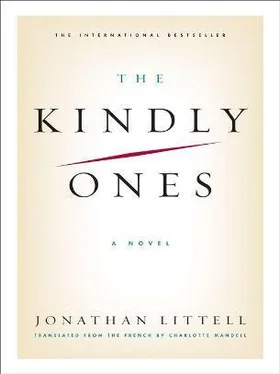It wasn’t a problem of humanity. Some people, of course, could criticize our actions in the name of religious values, but I wasn’t one of them, and in the SS there must not have been many; or in the name of democratic values, but we had moved beyond what is called democracy in Germany sometime ago. Blobel’s arguments, in fact, were not entirely idiotic: if the supreme value is the Volk , the people to which one belongs, and if the will of this Volk is embodied in a leader, then in fact, Führerworte haben Gesetzeskraft . But still it was vital to comprehend within oneself the necessity of the Führer’s orders: if one accepted them out of a simple Prussian spirit of obedience, out of a Knecht’s spirit, without understanding them and without accepting them, that is without submitting to them, then one was nothing but a sheep, a slave and not a man. When the Jew submitted to the Law, he felt that this Law lived in him, and the more terrible, hard, demanding it was, the more he loved it. National Socialism had to be that too: a living Law. Killing was a terrible thing; the reaction of the officers was a good proof of that, even if they didn’t all draw the consequences of their own reactions; and the man for whom killing was not a terrible thing, killing an armed man as well as an unarmed man, and an unarmed man as well as a woman and her child, was nothing but an animal, unworthy of belonging to a community of men. But it was possible that this terrible thing was also a necessary thing; and in that case we had to submit to this necessity. Our propaganda repeated over and over again that the Russians were Untermenschen , sub-humans; but I refused to believe that. I had interrogated captured officers, Commissars, and I saw that they too were men like us, men who wished only good, who loved their families and their country. But these Commissars and these officers had caused millions of their own fellow citizens to die, they had deported the Kulaks, starved the Ukrainian peasantry, repressed and shot the bourgeois and deviationists of all stripes. Among them were sadists and psychopaths, of course, but also kind men, honest and upright, who sincerely wanted the good of their people and of the working class; and though they had gone astray, they were still men of good faith. They too were for the most part convinced of the necessity of what they were doing, they weren’t all madmen, opportunists, and criminals like that Kieper; among our enemies too, a good and honest man could convince himself to do terrible things. What they were asking us to do now posed the same problem for us.
The next day I awoke distraught, with a sad rage stuck in my head. I went to see Kehrig and closed the office door: “I’d like to talk with you, Sturmbannführer.”—“What about, Obersturmführer?”—“About the extermination order.” He raised his bird’s head and stared at me through his fine-rimmed glasses: “There is nothing to discuss, Obersturmführer. Anyhow I’m leaving.” He gestured to me to sit down. “You’re leaving? How’s that?”—“I settled it with Brigadeführer Streckenbach, with the help of a friend. I’m going back to Berlin.”—“When?”—“Soon, in a few days.”—“And your replacement?” He shrugged: “He’ll come when he comes. In the meantime, you’ll run the shop.” He stared at me again: “If you want to leave too, you know, that can be arranged. I can go see Streckenbach for you in Berlin, if you like.”—“Thank you, Sturmbannführer. But I’ll stay.”—“Why?” he asked sharply. “To end up like Häfner or Hans? To wallow in this mud?”—“You’ve stayed till now,” I said gently. He laughed dryly: “I requested my transfer at the beginning of July. In Lutsk. But you know how it is, it takes time.”—“I’ll be sorry to see you leave, Sturmbannführer.”—“Not me. What they want to do is insane. I’m not the only one who thinks so. Schulz, from Kommando Five, broke down when he learned about the Vernichtungsbefehl . He asked to leave right away, and the Obergruppenführer gave his consent.”—“You might be right. But if you leave, if Oberführer Schulz leaves, if all the honorable men leave, only the butchers will be left here, the dregs. We can’t accept that.” He made a grimace of disgust: “Because you think you can change something if you stay? You?” He shook his head. “No, Doktor, follow my advice, leave. Let the butchers take care of the butchering.” “Thank you, Sturmbannführer.” I shook his hand and left. I headed for the Gruppenstab and went to find Thomas. “Kehrig is a sissy,” he said curtly when I had reported the conversation to him. “Schulz too. We’ve had our eye on Schulz for a while now. In Lemberg, he let some condemned men go, without permission. All the better if he leaves, we don’t need men like that.” He looked at me pensively. “Of course, it’s atrocious, what they’re asking us to do. But you’ll see, we’ll get through it.” He suddenly grew even more serious. “I don’t believe it’s the right solution. It’s an emergency response, improvised because of the war. We must win this war soon; afterward, we can discuss things more calmly, and carefully think them through. More subtle opinions can be taken into account. With the war, that’s impossible.”—“Do you think it will last much longer? We were supposed to reach Moscow in five weeks. It’s been two months now and we haven’t even taken Kiev or Leningrad.”—“It’s hard to say. It’s obvious that we underestimated their industrial potential. Every time we think their reserves are exhausted, they throw fresh divisions at us. But they must be reaching the end now. And also, the Führer’s decision to send us Guderian will soon open up the front, here. As for Army Group Center, since the beginning of the month, they’ve taken four hundred thousand prisoners. And in Uman we’re also surrounding two entire armies.”
I returned to the Kommando. In the mess, alone, Yakov, Bohr’s little Jew, was playing the piano. I sat down on a bench to listen to him. He was playing Mozart, the andante of one of the sonatas, and it brought a lump to my throat, deepening my sadness even more. When he had finished I asked him: “Yakov, do you know Rameau? Couperin?”—“No, Herr Offizier. What is it?”—“It’s French music. You should learn it. I’ll try to find some scores.”—“Is it beautiful?”—“It might be the most beautiful thing there is.” “More beautiful than Bach?” I considered the question: “Almost as beautiful as Bach,” I acknowledged. This Yakov must have been about twelve years old, and could have played in any concert hall in Europe. He came from the region of Czernowitz and had grown up in a German-speaking family; with the occupation of the Bukovina, in 1940, he’d found himself in the USSR; his father had been deported by the Soviets and his mother had died in one of our air raids. He was truly a handsome boy: a long narrow face, full lips, black hair in untamed tufts, long blue-veined fingers. Everyone here liked him; even Lübbe left him alone. “Herr Offizier?” Yakov asked. He kept his eyes on the piano. “Can I ask you a question?”—“Of course.”—“Is it true that you’re going to kill all the Jews?” I straightened up: “Who told you that?”—“Last night, I heard Herr Bohr talking with the other officers. They were shouting very loudly.”—“They were drinking. You shouldn’t have been listening.” He insisted, his eyes still lowered: “So you’ll kill me, too?”—“Of course not.” My hands were tingling, I forced myself to keep a normal, almost cheerful tone of voice: “Why would we want to kill you?”—“I’m Jewish too.”—“That’s all right, you work for us. You’re a Hiwi now.” He began hitting a key gently, a high note: “The Russians always told us that the Germans were mean. But I don’t think so. I like you.” I didn’t say anything. “Would you like me to play?”—“Play.”—“What would you like me to play?”—“Play whatever you like.”
Читать дальше










